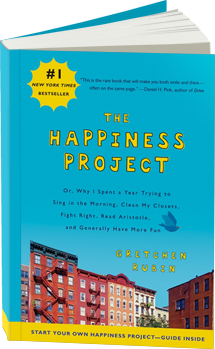We all want to be happier, but what does that really mean?
A popular blogger’s quest to answer to that question may help you discover
what truly makes you happy. Dr. Liz Hale, shares her favorite tips from The
Happiness Project.
Have you ever wondered if or how you could be happier?
One rainy afternoon, while riding a city bus, Gretchen Rubin asked herself,
“What do I want from life, anyway?” Her answer? “I want to be happy” ~yet she
realized she spent no time thinking about happiness. In that moment she
grasped two truths about herself: she wasn’t as happy as she could be, and
her life wasn’t going to change unless she herself made a change. Her
epiphany of, “the days are long but the years are short” made her realize that
time is passing quickly and she wanted to focus more on things that really
mattered. Thus, she dedicated an entire year to the study of happiness. Her
book, The Happiness Project, merges the wisdom of the ages with current
scientific research. Gretchen Rubin’s idea for a happiness project is no longer
just a book or a blog; it’s a movement.
She dedicated each month in a year to an important happiness concept; I
chose 5 of my favorites to introduce to you.
“The Happiness Project”
BOOST ENERGY
Acting energetic causes you to become more energetic.
Research shows a virtuous cycle: being happy energizes you; in turn, feeling
energetic makes it easier to engage in activities like socializing and
exercising, which, in turn, leads to increased happiness, and so the cycle
continues. Studies also show that when you feel energetic, your self-esteem
rises. Feeling tired, on the other hand, makes everything seem arduous. Go
to sleep earlier.
· Exercise better.
· Toss, restore, and organize.
· Tackle a nagging task.
· Act more energetic.
BE SERIOUS ABOUT PLAY
· Find fun.
· Take time to be silly.
· Go off the path.
· Start a collection.
Studies show that the absence of feeling bad isn’t enough to make you happy
– we need to find ways to feel good, and play is one of them!
Fun falls into three categories: Relaxing fun, challenging fun and
accommodating fun. I love Jerry Seinfeld’s quote, “There’s no such thing as
‘Fun for the whole family.'” Going to a family holiday dinner, even going to
dinner and movie with friends requires accommodation. It strengthens
relationships, build memories and its fun ~ but it takes a lot of organization
and coordination.
Research shows that challenging fun and accommodating fun, over the long
term, bring more happiness because they are sources of they are the sources
of the elements that make people happiest: strong personal bonds, mastery,
and an atmosphere of growth.
MAKE TIME FOR FRIENDS
· Remember birthdays.
· Be generous.
· Show up.
· Don’t gossip.
· Make three new friends.
By acting friendlier, we feel friendlier. Acting in an outgoing, talkative,
adventurous or assertive way makes people – even introverts – feel happier.
One conclusion is blatantly clear in happiness research: everyone from
contemporary scientists to ancient philosophers agrees that having strong
social bonds is probably the most meaningful contributor to happiness. We
need close long-term relationships, we need to confide in others, and we
need to belong. Having strong relationships lengthens life, boosts immunity
and cuts the risk of depression.
A big part of friendship is showing up. Unless we make consistent efforts,
our friendships aren’t going to survive.
It’s easy to say to yourself, “I don’t have time to meet new people or make
new friends,” but usually that’s not true, and making a new friend is
tremendously energizing not enervating. New friends expand our world by
introducing us to new experiences, interests, opportunities, and can be an
invaluable source of support and information. You can play the same role for
them!
One strategy this author adopted for making friends was that any time she
entered a social situation where she was meeting new people; she set herself
a goal for making three new friends. Having a numerical goal seemed
artificial at first but it helped her change her attitude from, “Do I like you? Do
I have time to get to know you,” to ” Are you someone who will be one of my
three friends?” Somehow this shift made her behave better: it made her more
open to people; it prompted her to make more of an effort to get to know
others.
BUY SOME HAPPINESS
· Indulge in a modest splurge.
· Buy needful things.
· Spend out.
· Give something up.
Money alone can’t buy happiness. But money can help buy happiness when
spent wisely. Whether rich or poor, people make choices about how they
spend money and those choices can boost happiness or undermine it. We can
all do a better job of spending money in a way that boosts happiness.
Think about spending money on things that help you to stay in closer contact
with family and friends; to promote energy and health; to live in a more
serene, organized environment; to work more efficiently; to eliminate sources
of boredom, irritation or conflict; and to have experiences that will enlarge
you.
Instead of grabbing a bagel for lunch because it’s inexpensive and quick,
think about spending more on a nutritious salad or soup and fruit in order to
do something for your long-term health.
CONTEMPLATE THE HEAVENS
· Read memoirs of catastrophe.
· Keep a gratitude notebook.
· Initiate a spiritual master.
People assume that a person who acts happy must feel happy, but although
it’s the very nature of happiness to seem effortless and spontaneous, it often
takes great skill.
One of the passages in Story of a Soulby Therese is most compelling in the
view of happiness research. She observes that “for the love of God and my
Sisters, I take care to appear happy and especially to be so.”
We can set out to imitate Therese by doing a better job of acting happy when
we know that our happiness would make someone else happy. We don’t want
to be fake but we can make more of an effort to be less critical. We could find
ways to be authentically enthusiastic about new foods that aren’t necessarily
our favorite, activities that aren’t our first choice, or movies, books and
performances with which we could usually find fault. Usually, we can find
something to praise if we make the effort to do so!
For the love and family and friends, let’s appear happy and, especially, to be
happy.
A former radio host of Bonneville’s “Dr. Liz Hale Show,” Dr. Liz has become a
household name to many. As Studio 5’s resident shrink, she discusses a wide
variety of hot-topics ranging from sex to stress. (Sometimes all in the same
segment!)
Dr. Liz is a transplant from Seattle, Washington, although “a few” years ago
was a college co-ed cheering for the Utah State Aggies. While USU football
hasn’t changed through the years, she remains a loyal fan. Dr. Liz, a Licensed
Clinical Psychologist, has been in private practice for 12 years specializing in
marriage and family relations. She currently serves as a board member on the
Utah Commission on Marriage and is a popular speaker at their annual
conference.
Her greatest joy in life comes from being with her own family and working
with other families along the Wasatch Front at her downtown SLC practice.















Add comment